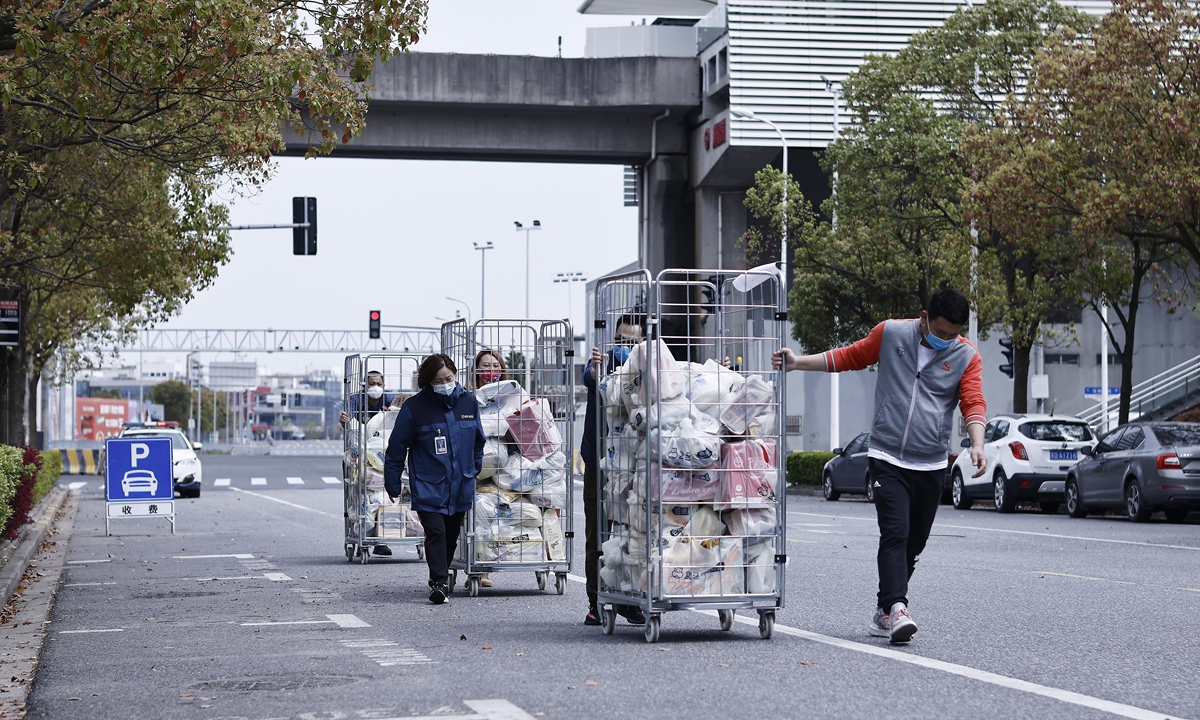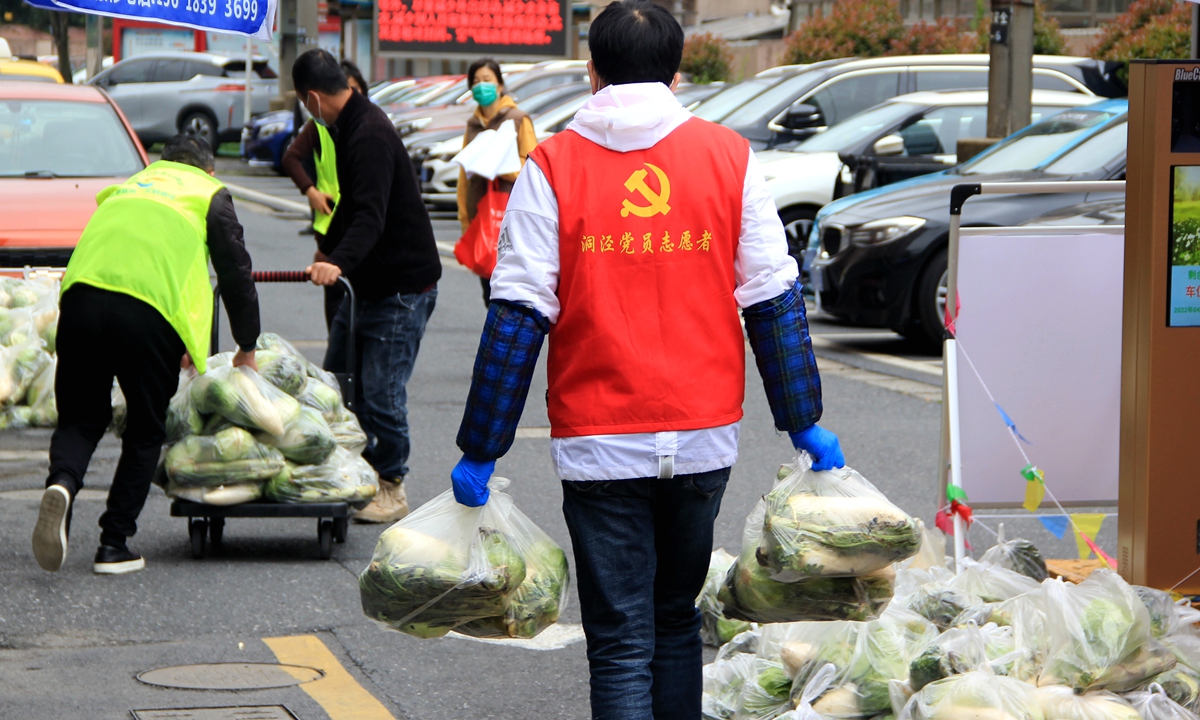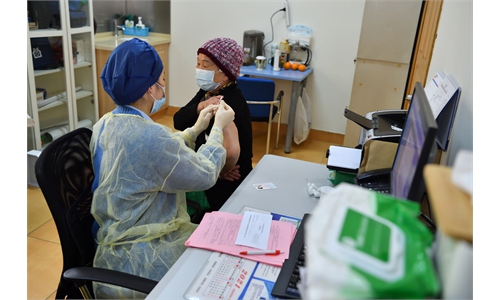IN-DEPTH / IN-DEPTH
Shanghai’s lockdown-born residential community ‘bulk-buying organizers’ become grass-roots ‘life-savers’ in modern battle against coronavirus disease
Heroes of neighborhood

Grocery store deliverymen carry the residential group purchase items to their designated areas in Shanghai on April 1, 2022. Photo: VCG
When an Omicron-hit Shanghai entered an almost total COVID-19 lockdown requiring millions of people to stay home, 47-year-old newspaper editor Feng Yu, who had no initial group-buying experience, did not expect to become her building's unofficial broker - or "Tuanzhang" in Chinese - to source for groceries for her neighbors via dozens of WeChat groups amid dwindling supplies.
As the metropolis of 26 million was hit by intermittent shortages during the lockdown, which started on March 28 but has since been extended, ad hoc collectives ordering directly from wholesale vendors have become an innovative and indispensable solution to relieve societal pressure as demand for food and essential goods continue to surge.
The residential community group-buying organizers unofficially initiate and coordinate bulk-purchases and distribution, colloquially referred to as "Tuanzhang" (bulk-buying master or head of bulk-buying group) - a military term commonly used in times of war meaning "regimental commander."
Since the end of March, the popularized term denotes how these organizers spearhead the fight against the coronavirus disease through forming mutual-support groups with their neighbors.
Mobile phones are their weapons, WeChat groups are their main battleground, and the mission is to deliver supplies to all in need. They guard the rear of this megacity in conjunction with all other forces and government efforts alongside, working tirelessly to see their mission through.
The role of a community "bulk-buying organizer" has quickly become a respected and highly relied-upon voluntary role to support the supply chain of materials in the localized intensive fight against the coronavirus disease.
Billionaires do seem to be no exception in striving for ways to buy daily essentials, as a screenshot of a message by Kathy Xu Xin, dubbed "China's venture capital queen," looking for a bulk-buying group to acquire bread and milk for her family went viral on social media on April 7, local media reported.
Currently, the bulk-buying leaders are still the main channels from which to buy the daily necessities across locked-down Shanghai, though a small number of lockdown residential communities have gradually lifted various restrictions to allow residents to go shopping for themselves.
Community group-buying efforts constitute a demand that cannot always be covered by the government's supply chain, making it an effective complement, as community committees and delivery apps can't always keep up with the surging number of people trying to get a hold of daily essentials.
"Shanghai faced a grim challenge when the current resurgence of the epidemic struck us largely due to a deficit of manpower in grass-roots communities. The group of bulk-buying coordinators who band residents at the same address together to buy necessities in bulk shows great resilience and vitality among Shanghai grass roots," Liu Yuelai, a professor at the College of Architecture and Urban Planning at the Tongji University in Shanghai who is also in charge of a bulk-buying volunteer group at his own community, told the Global Times on Thursday.
Being a voluntary bulk-buying organizer, although one of the most popular people in the community, is never an easy job and is more like the role of a "senior office manager who possesses outstanding multi-task abilities." A qualified bulk-buying leader needs to have the ability to find reliable wholesales, be good at organizing and communicating, and be strong-willed when facing challenges and even accusations.
Such a role is a reflection of Shanghai's current society to show the predicament many ordinary people find themselves in and also their differentiated needs.
Behind the success lies China's strong and mature logistics system, which has gone a long way in alleviating the understaffed supply chain amid the lockdown.

Volunteers carry supplies at community gates in Songjiang district, Shanghai on April 15, 2022. Photo: IC
Hunt for offers for neighbors
Shanghai has been the epicenter of China's latest COVID-19 outbreaks and the metropolis had the largest citywide lockdown since the epidemic was first reported in Wuhan in 2020.
The recent daily life of Shanghai residents reportedly consists of frantic deal-hunting various bulk-buying WeChat groups where commodities such as fruit, bread, vegetable, milk, and eggs are highly sort after.
Currently, Liu's typical day starts at 7 am as he awakes to countless messages from various bulk-purchasing groups, after which he gives numerous bits of feedback across dozens of WeChat groups until midnight. From each order placed to the eventual delivery, the entire process is anxiety-ridden, with the constant worry that phone batteries might run low and he would sometimes have to skip meals because of an impossibly busy schedule.
Liu signed up to be a volunteer and block administrator when his residential area was due to go into lockdown.
He lives in a large community of more than 1,700 households with 3,600 people, over 80 percent of them hadn't joined any online community group chat prior to lockdown. Many young people who are usually indifferent to neighborhood activities reached out to Liu after the lockdown through his social media handle, eager to join a bulk-buying group.
After talking to the neighborhood committee, Liu took the lead in setting up the community volunteer group and divided them into three branches - information updaters, bulk-buying coordinators, and sterilized commodity distributors.
Offers are shared fast on social media, and whenever enough buyers sign up to meet minimum order requirements, wholesalers will dispatch the goods to the residential complex, and building security guards or volunteers will then drop off each order door to door, said Liu.
Liu's weekends are busier and tiring than his weekdays - as a lecturer, he has daily online courses to manage. But he invests over a dozen hours in coordinating the community's volunteer work and responding to millions of messages.
Still, some residents may balk at the expense or reject unreliable orders for whatever reasons, which can be a challenge, he said. They have even had to write an apology letter to buyers for unsatisfactory deals.
But they continue to be on the hunt for more offers for neighbors, even as they juggle their newfound responsibility along with their day jobs.
Lightning-fast responses via text in online group chats put many senior citizens at a disadvantage. "So we have specially opened a green portal for the elderly to guarantee that supply to them is prioritized, considering that most group purchases will reach a maximum number of buyers very quickly," Liu told the Global Times.
"We go door-to-door hearing directly from them about what their needs are before carefully sourcing for affordable wholesales. And we also contribute some of our own purchases into their order bags for free to make sure their health amid limited supply. I sometimes attach a note on bags with warm encouragement to them for jointly overcoming the difficult days that we have collectively experienced," said Liu.
"The extension of lockdown in most areas of Shanghai from April 1 caught numerous people off guard. When I saw some families with both elderly family members and children in the WeChat group asking for help, and I happened to have a friend who could contact qualified fruit and vegetable suppliers, I felt I should do something for them," said 47-year-old Feng.
From carefully sourcing and examining the suppliers to initiating group purchases and collecting bills to final goods' dispatches, Feng has put tremendous effort into every step.
The delivery schedule turned out to be unpredictable during the lockdown, which meant the "Tuanzhang" would have to get up in the wee hours to receive deliveries, an awesome responsibility that came with great pressure. At times, mistakes would happen, as Feng confessed that she once miscalculated an order which meant she would personally have to miss out on a delivery. She made her first successful group order of 55 packages of vegetables and 85 packages of fruits for her community between April 4 and 7.
Feng believes that a competent community group-buying organizer has to be a good communicator, a smart accountant, a talented sourcing agent, and a great risk evaluator with resilience to handle various complexities.
Fortunately, each of the 11 residential buildings in Feng's neighborhood, with nearly 400 households, has several dedicated volunteers to help Feng deal with the highly complex work. "Even at times when a supplier suddenly informs me that groceries will be delivered very early the next day, there are many people who volunteer to come down at that time to help offload and distribute the goods together, which feels like a familial effort," Feng said.
An effective supplement to government offers
Resident Julie Huang, who had been quarantined at her home in Shanghai's Pudong New Area for 31 consecutive days as of Monday, told the Global Times that as much as 80 percent of her daily necessities during the quarantine, such as food, detergent, and toilet paper, were met through the community group-buying efforts.
To the residents and some enterprises in Shanghai, the community group-buying mode, though still in its infancy, has contributed positively during this special lockdown period.
The exquisite and diversified needs of people in Shanghai were also met in some special-interest community buying-groups such as "coffee" and "red wine."
Many residents told the Global Times that, thanks to the group buying, which guaranteed most of the daily necessities that ordinary people needed, the government was able to spend more time and manpower in helping those who demand more urgent care, such as those infected with COVID-19, critically ill patients, and the elderly who live by themselves.
Feng believes that bulk-buying organizers helped relieve the initial scramble by lower-level governments when the outbreak hit the megacity in the early days and helped alleviate resultant incompetency seen in the following days by providing services in a timely manner.
Community group buying also provided quarantined residents with diversified options of foods based on their different needs and preferences.
"The food packages that government gives us for free usually contain only three to four basic items, such as vegetables and biscuits," Huang said. "With the help of community group buying, we can get beef, milk, fruits, and even shrimp. That's good to the elderly, the kids, and the pregnant women whose nutritional needs are varied."
The business mode benefits local enterprises as well, especially those in the food industry, observers pointed out. For the food producers and dealers who saw a drastic reduction in orders when COVID-19 hit Shanghai, community group purchasing offered them an opportunity to continue selling products to residents amid lockdown, which helped reduce economic losses caused by the epidemic.
"With the group-buying mode, in addition to other supportive policies such as tax subsidies from the Shanghai government, hopefully, there will be fewer bankrupted enterprises and laid-off employees this time," observers said.
Strong logistics system behind it
"Bulk buying" is supported by China's powerful and advanced e-commerce logistics network and a strong logistics reserve force that has been in operation for many years, which is playing a key role in guaranteeing people's livelihoods.
Developed e-commerce logistics have also been an important pillar in China's success in helping fight the epidemic, although challenges still remain, observers said.
The rapid development of China's e-commerce enables Shanghai to flexibly distribute purchased items. During Shanghai's lockdown, this flexibility has been mainly presented as "transporting different items to residents at different speeds," said some Shanghai locals reached by the Global Times.
"Medicines enjoy a high priority," Huang said. "Even during the citywide lockdown, when almost all of our nearby shops are closed, the pharmacies remain open and I could still buy medicines online."
An expectant mother in her second trimester, Huang recalled that she bought medication meant for pregnant women to use at the beginning of this month. The medicine was sent to her only one hour after she ordered it online. "I was so surprised and impressed," Huang said. "In this hard time, the city gives its limited transport capacity to those who need it the most."
China's delivery giants Meituan and Eleme have been offering "emergency demand" services in Shanghai. The services target expectant mothers, senior citizens living alone, families with infants, and people with disabilities, helping them to buy and transport medicines they need since early April.
Some major online grocery-store networks such as Hema Fresh and many other express delivery and logistics companies are speeding up to release more qualified local staff back to work. Transportation priority has been given to anti-epidemic supplies and essentials for residents.
Despite the bulk-buying brokers growing in popularity, The unscrupulous behaviors exhibited by some has repeatedly been exposed online, while many call a halt of bulk-buying citing contagion risks and corruption.
Complaints have been received from various communities over bulk-buying organizers making a fat profit through the price gouging as they act as middlemen between dealers and residents. Some social media posts shared by Shanghai residents have been sounding the alarm on overly expensive items they purchased from bulk-buying groups, with calls for further regulation and official support. Shanghai authorities vowed on April 13 to further curb extortionist group buying.
Feng told the Global Times that the most difficult time has passed, and the government and enterprises have provided enough materials and logistical support. "
Grass-roots authorities have also learned lessons from practical experience," she said.
On April 17, Feng's neighborhood committee halted community group purchases and, instead organized a unified supply assurance unit to meet households' various needs.



